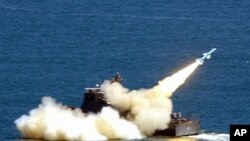Taiwan has drawn closer to mainland China since President Ma Ying-jeou came to office in 2008. Despite the improved ties, Taiwan still plans to deploy its own missiles, which would have the ability to hit China.
Taiwan plans to deploy cruise missiles by the end of this year.
The Taiwan-built Hsiung Feng II E missiles have a range of about 800 kilometers, making them capable of hitting airports or missile bases in southeast China, as well as Shanghai and Hong Kong.
Taiwan and mainland China have been governed separately for over 60 years, since Nationalist forces fled to Taiwan after losing the civil war in China. Relations have historically been tense, but have improved under President Ma Ying-jeou. Since he came to office in 2008, the two sides have signed a historic economic agreement and allowed direct flights and tourist visits.
Even so Taiwan and China are still building up their military forces.
Why now?
Lin Chong-pin is a former deputy defense minister in Taiwan, and now is a professor at Tamkang University's Graduate Institute of International Affairs and Strategic Studies. He explains why Taipei is developing the Hsiung Feng missiles.
"It's probably a necessary deterrent so that both sides of the Taiwan straits take time to develop trust and do not resort to the action of war," Lin said.
Lin thinks it is unlikely Taiwan will aim the missiles at cities such as Shanghai, where many Taiwanese businessmen reside.
Some experts on cross-strait relations say Taipei wants to develop its own weapons in part because Beijing opposes United States arms sales to Taiwan.
US sales
This year the U.S. approved a $6 billion arms sale to Taiwan. The package consists mostly of defensive weapons, and Washington has not yet agreed to sell the advanced F-16 fighter planes that Taiwan covets. The sale of the advanced fighter jets would likely provoke a fierce reaction from Beijing.
However, Lin at Tamkang University says Beijing will not react too strongly to Taiwan's Hsiung Feng missiles.
"They have learned not to overreact on things like that. For some time now, Beijing scholars and officials have been saying that we understand the feeling of people in Taiwan: they care about two things most," Lin said. "One is their safety, the other one is the political status, meaning the definition of Republic of China."
Rapprochement
In recent years, China has worked to win the favor of Taiwan's people by setting political differences aside and drawing closer to economically. The two sides have signed 14 agreements since President Ma came to office and China made many concessions in their recent landmark economic agreement.
But China still has more than 1,000 missiles pointed at Taiwan. A recent U.S. Defense Department report said that China is continuing to build up its forces against Taiwan despite warming ties.
Even with China's military buildup, political scientist Yang Tai-shuenn at Taipei's Chinese Culture University thinks that cross-strait conflict is unlikely since the two sides are growing closer.
"Even though I think the military balance on both sides is more and more disfavorable [unfavorable] to Taiwan but I don't really worry about this development because I can't perceive any military conflict can occur in the next 5 or 10 years," Yang said.
Many Taiwanese agree. A survey released last week showed that most Taiwanese think that a cross-strait conflict is unlikely. On a scale of 1-10, respondents said the likelihood of conflict with China was only three.




